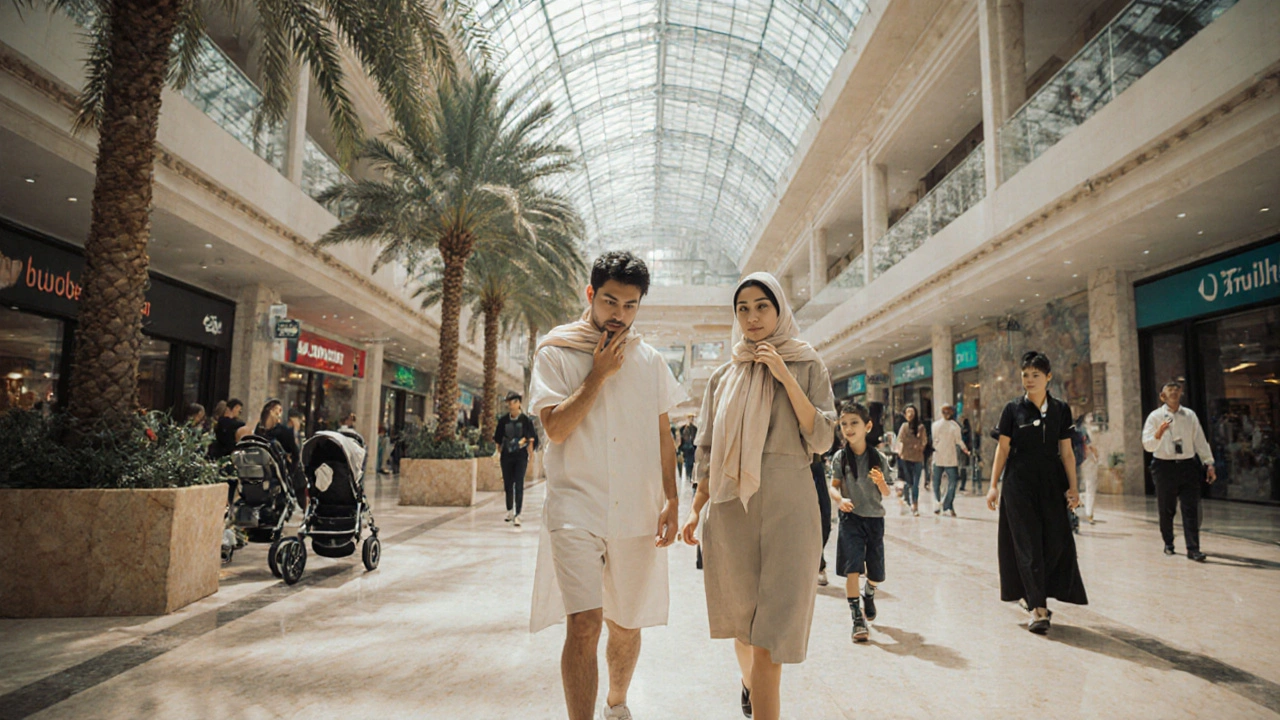Dubai Dress Code: Simple Guide for 2025 Visitors
If you’re heading to Dubai, the first question on most people’s minds is what to wear. The city mixes modern skyscrapers with traditional values, so getting the dress right helps you feel comfortable and avoid unwanted attention. Below is a quick, no‑fluff rundown of the dress rules you need to know, from malls to mosques.
Public Places and Shopping Malls
Most public areas, like malls, restaurants, and streets, expect modesty but are pretty relaxed. For men, a short‑sleeve shirt and clean trousers are fine. Avoid sleeveless tops or beachwear when you’re not at the beach. Women can wear dresses, skirts, or trousers, but it’s best to keep shoulders covered. A light cardigan or a scarf works great for air‑conditioned spaces where the temperature can drop.
When you’re in a family‑friendly mall, steering clear of overly tight or revealing clothes shows respect for the local culture. Think of it as dressing for a business casual meeting rather than a night out. If you’re unsure, look around – the majority wear about‑ankle pants or longer skirts and tops with sleeves.
Beaches, Nightlife, and Religious Sites
Beachwear is the one place you can be more relaxed. Swimsuits are acceptable on public beaches and hotel pools, but walking away from the sand in just a swimsuit is a no‑go. Throw on a cover‑up or a loose shirt as soon as you leave the water.
Nightclubs and bars let you turn up the style a bit. Trendy dresses, smart shirts, and even short shorts work here, but keep it classy. No overly revealing outfits, no see‑through fabrics, and definitely no exposed midriffs. The same rule applies to high‑end restaurants – dress smart, but not flashy.
Religious sites have the strictest dress code. Mosques require men to wear long trousers and a shirt with sleeves; women must cover their hair, wear long sleeves, and bring a scarf to cover the head. Skirts should reach at least the ankle, and both genders should avoid tight or short clothing. Many mosques provide a prayer rug and sometimes a shawl for visitors, but bringing your own is always a good idea.
Air conditioning is strong in Dubai, so layering is key. A light jacket or a thin sweater will keep you from catching a chill while still looking polished. The climate is hot outdoors, so breathable fabrics like cotton or linen help you stay cool without sweating through your outfit.
Here are a few quick do’s and don’ts to keep in mind:
- Do wear shoulder‑covering tops in public areas.
- Do keep skirts and dresses at least knee‑length.
- Do bring a scarf for mosques or any religious site.
- Don’t wear swimwear inside malls or restaurants.
- Don’t flaunt ultra‑short shorts or tight eyeliner‑type dresses on the street.
Following these simple tips lets you blend in, stay comfortable, and focus on enjoying Dubai’s amazing food, architecture, and nightlife. Remember, the city is used to tourists, so a respectful outfit goes a long way in making your trip smooth and memorable.

- Nov, 16 2025
- 0 Comments
Can You Wear Shorts in Dubai? What to Wear in Public Places
Can you wear shorts in Dubai? Yes-but only in the right places. Learn where shorts are allowed, where to avoid them, and how to dress respectfully without sacrificing comfort.
read more
- Oct, 1 2025
- 0 Comments
What Is Inappropriate in Dubai? Laws, Dress Code, and Etiquette (2025 Guide)
What�19s considered inappropriate in Dubai? A clear 2025 guide to laws, dress, PDA, alcohol, social media, Ramadan etiquette, meds, and easy rules to stay out of trouble.
read more
- Sep, 3 2025
- 0 Comments
Can You Show Cleavage in Dubai? 2025 Dress Code Rules Women Actually Use
Wondering if you can show cleavage in Dubai? Clear 2025 guide for women: where it’s fine, where it’s not, what to pack, and how to avoid awkward moments.
read more
- Aug, 7 2025
- 0 Comments
Dubai Women's Rules: Dress Code, Rights & Social Guidelines for Female Travelers
Wondering how women should act and dress in Dubai? Find real facts and practical tips for female travelers. Learn what’s expected and what’s not for women in Dubai.
read more
- Jul, 2 2025
- 0 Comments
Dubai Dress Code for Women: Can Girls Show Skin?
Get real answers about whether girls can show skin in Dubai, with advice, local laws, cultural facts, and tips for packing. Stay stylish and respectful.
read more
- May, 1 2025
- 0 Comments
Can I Wear Shorts in Dubai? Dress Code Rules for Escorts and Tourists
Thinking about wearing shorts in Dubai? This guide explains when and where it's actually okay and where you could get in trouble. You'll learn the real rules about Dubai's dress code, what people are actually wearing, and some things nobody tells tourists before they visit. Get practical tips on staying cool, looking good, and staying out of trouble if you work as an escort or just want to explore Dubai comfortably. Don't let the heat or the rules catch you off guard.
read more
- Apr, 23 2025
- 0 Comments
Can Girls Wear Whatever in Dubai? Dress Codes, Reality, and Smart Tips
Wondering what girls can really wear in Dubai? This article breaks down the dress codes you’ll face—public, private, or even when working as an escort. Find out where it’s strict, where you can loosen up, and how to avoid trouble while looking good. Plus, get honest tips so you don’t stick out for the wrong reasons. Dubai’s style rules aren’t as complicated as people think—if you know where you’re going.
read more